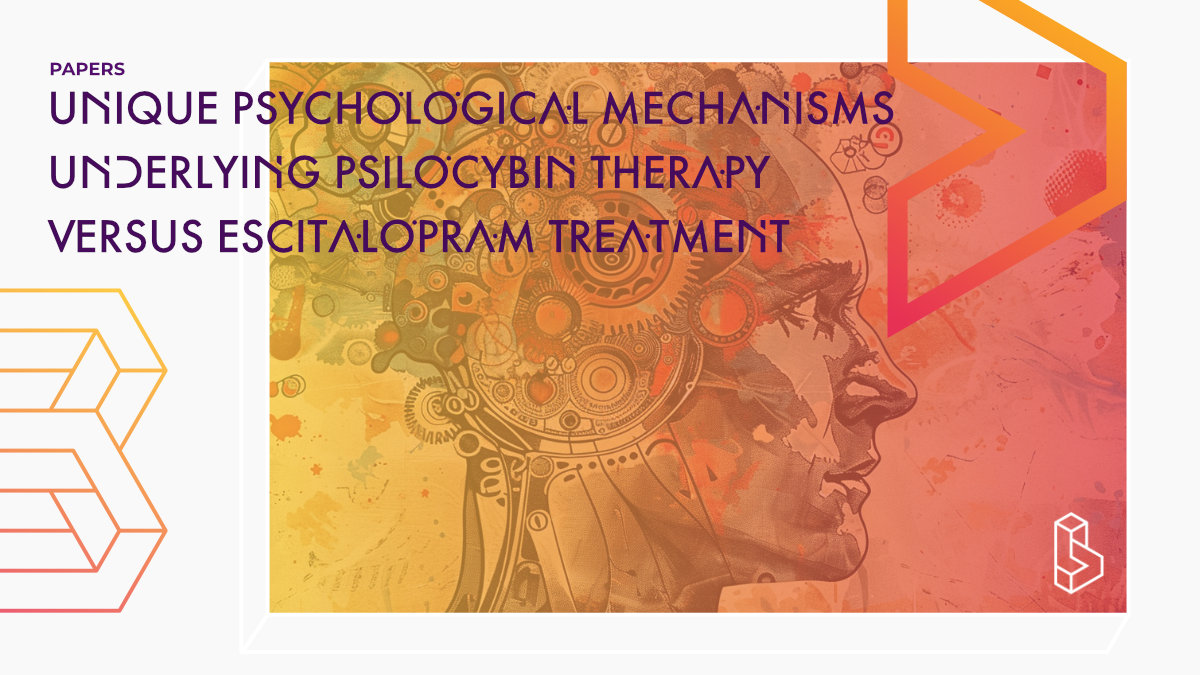This reanalysis of a trial (n=59) investigates the mechanisms underlying the efficacy of Psilocybin Therapy (PAT) versus Escitalopram Treatment in patients with depression (MDD) over a 6-week trial period. Acute psychological experiences such as “mystical experience” and “ego dissolution” were found to mediate the effect of treatment condition on depressive response, suggesting a mechanistic role of these experiences in the treatment of depression via PAT.
Abstract of Unique Psychological Mechanisms Underlying Psilocybin Therapy Versus Escitalopram Treatment in the Treatment of Major Depressive Disorder
“The mechanisms by which Psilocybin Therapy (PT) improves depression remain an important object of study, with scientists actively exploring acute psychological experiences and neurobiological processes as candidates. In a phase 2, double-blind, randomized, active comparator controlled trial involving patients with moderate-to-severe major depressive disorder, we investigated whether acute psychological experiences could meaningfully account for the unique efficacy of PT versus Escitalopram Treatment over a core 6-week trial period. An exploratory-factor-analysis-derived single-factor of depression was used as the outcome. Among a comprehensive set of acute experiences related to psilocybin, so-called “mystical experience” and “ego dissolution” were unique in mediating the effect of treatment condition on depressive response with high specificity. Higher reported levels of mystical experience, emotional breakthrough, and intense responses to music-listening were furthermore associated with greater antidepressant response. These results provide qualified support for the causal mechanistic role of acute psychological experiences in the treatment of depression via PT.”
Authors: Brandon Weiss, Leor Roseman, Bruna Giribaldi, David J. Nutt, Robin L. Carhart-Harris & David Erritzoe
Summary of Unique Psychological Mechanisms Underlying Psilocybin Therapy Versus Escitalopram Treatment in the Treatment of Major Depressive Disorder
In a double-blind randomized controlled trial, patients with major depressive disorder who underwent Psilocybin Therapy (PT) had greater therapeutic responses than those who underwent Escitalopram Treatment (ET), a common SSRI plus psychological support.
Two double-blind cross-over studies have demonstrated a significant indirect effect of acute psychedelic experience, namely, so-called “mystical experiences”, on clinical outcomes (i.e., depression and anxiety related to terminal cancer). The level of mystical experience was also associated with better therapeutic response.
A number of studies have found that acute experiences are associated with improved mental health outcomes post-psychedelic use, including smoking craving, smoking abstinence, and depression. Additionally, experiences of emotional breakthrough and psychological insight are especially strong moderators of improved mental health outcomes.
Find this paper
https://doi.org/10.1007/s11469-024-01253-9
Open Access | Google Scholar | Backup | 🕊
Cite this paper (APA)
Weiss, B., Roseman, L., Giribaldi, B., Nutt, D. J., Carhart-Harris, R. L., & Erritzoe, D. (2024). Unique Psychological Mechanisms Underlying Psilocybin Therapy Versus Escitalopram Treatment in the Treatment of Major Depressive Disorder. International Journal of Mental Health and Addiction, 1-36.
Study details
Compounds studied
Psilocybin
Topics studied
Depression
Study characteristics
Original Re-analysis
Placebo-Controlled
Active Placebo
Double-Blind
Randomized
Re-analysis
Participants
59
Humans
Institutes
Institutes associated with this publication
Limbic MedicalLimbic Medical investigate the underlying factors of pain, addiction, and mood disorders to customize an innovative whole-body approach to relieve suffering and achieve a balanced state of being.
Compound Details
The psychedelics given at which dose and how many times
Psilocybin 25 mg | 2xLinked Research Papers
Notable research papers that build on or are influenced by this paper
Trial of Psilocybin versus Escitalopram for DepressionThis double-blind placebo-controlled study (n=59) compared psilocybin (2x25mg; 3 weeks apart) to escitalopram (SSRI) over a six-week period and found large improvements in depression scores for those suffering from depression (MDD) in both groups. On the main measure of depression, the QIDS-SR-16, there was no significant difference between both groups. The study did find significant differences, favoring psilocybin, on the HAM-D-17, MADRS, avoidance, flourishing, wellbeing, and suicidality.
Linked Clinical Trial
Psilocybin vs Escitalopram for Major Depressive Disorder: Comparative MechanismsThis is a randomised double-blind clinical trial. The aim is to compare the efficacy and mechanisms of action of psilocybin, the primary psychoactive substance in 'magic mushrooms', with the SSRI (selective serotonin reuptake inhibitor) escitalopram for major depressive disorder (MDD).

